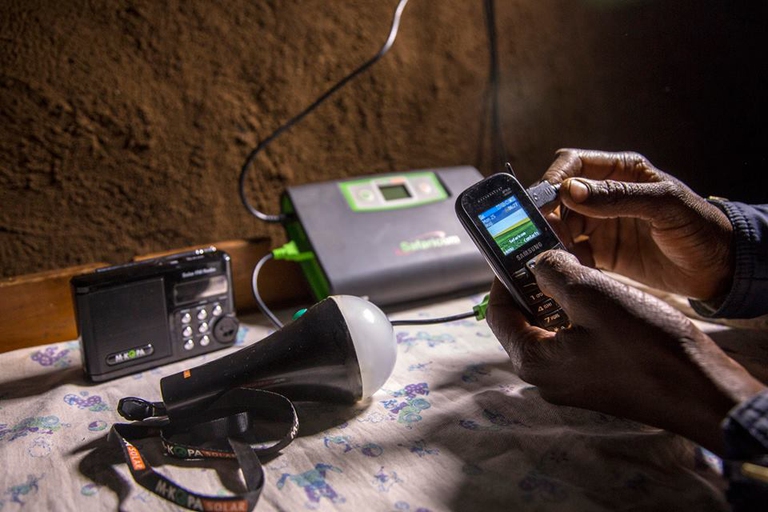
A group of experts in Tokyo suggested pouring radioactive water from Fukushima into the open sea. A marine biochemist explains the consequences of this absurd decision.
Since 2012, M-KOPA provides a kit made of a solar panel, LED lights, and charging USB. Everything at the cost of a telephone subscription.
Bringing electricity and grids to Western Africa’s poorest and most rural areas, at the cost of a telephone subscription. This is what M-KOPA – M stands for “mobile”, KOPA for “to borrow” – is doing. It is a Nairobi-based company that since 2012 brought energy to 200,000 families in Kenya, Tanzania, and Uganda.
M-KOPA provides a kit made of 1 8W solar panel, 2 LED lights with switches and multiple brightness settings, 1 LED portable solar torch light, 1 phone charging USB with 5 standard connections, 1 portable solar radio. Everything with an initial deposit of about 20 euros, followed by a daily payment of 30 cents per day for up to one year. It is could be compared to our “all inclusive” promotions.
The system, thanks to a GSM network, gathers all the data outright, thus monitoring real-time performance and consumptions. Technology, big data, and the grid provide electricity to the poorest populations, at affordable costs.
Considering that 1.3 billion people do not have direct access to electricity (source: Iea), it is evident how systems like M-KOPA are essential. In fact, from their official website emerges that they provide 500 new kits every day.
The system had a worldwide success, so that M-KOPA has been awarded several prices dedicated to sustainable finance and sustainable energy. There’s more. During the Global Entrepreneurship Summit held in Nairobi last July, US President Barack Obama was really impressed by the system, and told June Muli Head of the Costumer Care that “after a year of payments, for the next seven years you now have power and light in your house, you can charge your phones and that 40 cents a day is the same amount you’d be paying for kerosene.”
Siamo anche su WhatsApp. Segui il canale ufficiale LifeGate per restare aggiornata, aggiornato sulle ultime notizie e sulle nostre attività.
![]()
Quest'opera è distribuita con Licenza Creative Commons Attribuzione - Non commerciale - Non opere derivate 4.0 Internazionale.
A group of experts in Tokyo suggested pouring radioactive water from Fukushima into the open sea. A marine biochemist explains the consequences of this absurd decision.
A federal court in Washington, D.C. has struck down the Dakota Access Pipeline, following years of campaigning by the Standing Rock Sioux tribe.
The Scottish island of Eigg is self-sufficient for its energy needs, relying almost entirely on renewable sources, especially thanks to a coordinated community effort.
President Magufuli in unmovable in going ahead with the Stiegler’s Gorge dam despite conservationists’ warnings of the damage it will cause the Selous Game Reserve’s ecosystem and wildlife.
A large dam along the Luangwa River in Zambia would have posed a serious risk to local people and wildlife, leading hundreds of thousands to oppose it. A call to which the government responded by halting plans to build it.
The first one megawatt solar power plant in the Chernobyl exclusion zone has become operational. This is the first step in a renewable energy development project promoted by the Ukrainian government in the area.
A tanker exploded at a gas and petrol station in Nigeria’s Nasarawa state on the 10th of September, killing 35 people and leaving some burned beyond recognition; 3 citizens had several spine and brain injuries, 2 of them are still on Intesive Care Units. Fela Habila , a local singer, is now stable and out of danger but
The largest tidal power plant in the world will be built in the Larantuka Straits. It will serve 100,000 people and help overcome some of the challenges of energy provision in Indonesia.
Robben Island’s solar energy micro-grid project will produce almost one million kilowatt hours of electricity annually, significantly reducing the cost and impact of buying diesel.








